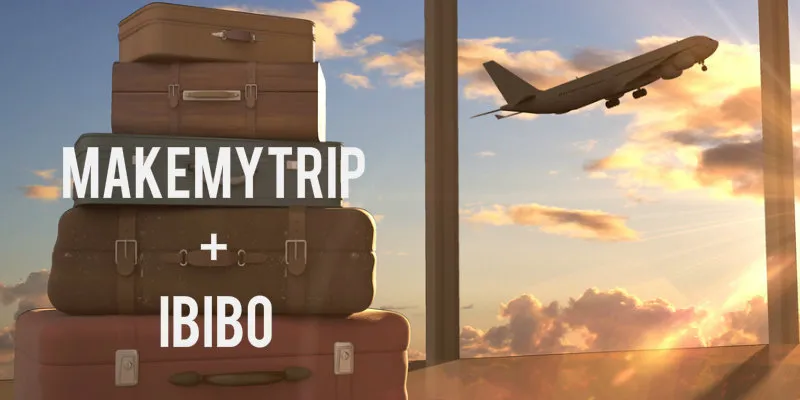How the MakeMyTrip-goibibo merger is set to impact the status quo in the OTA segment
Consolidation is a key to kill competition and control overheads that are largely borne by competing forces in order to grab market share or poach rivals' consumers. While rumours of consolidations between e-commerce rivals (Flipkart-Paytm, Paytm-Snapdeal, Snapdeal-Flipkart et al) have been doing the rounds for a long time, no one had strongly anticipated the merger of MakeMyTrip and goibibo in the online travel space. With the merger, the combined entity (MMT and goibibo) has become the online travel behemoth of the country. While the size of the deal remains undisclosed, some industry estimates suggest that goibibo was valued in the range of $500-$600 million. According to some media reports, the valuation of the combined entity is around $1.8 billion.

Will the combined entity kill competition?
To understand the impact of this merger, YourStory spoke to various stakeholders of the online travel agency space, and a majority of them pointed out that the combined entity will have an approximately 70 percent market share in the online hotel space and 60 percent share in the online flight booking segment. One of the top executives of the top three OTAs says,
These numbers clearly create a monopoly-like situation in the segment.
Incumbents like Yatra and Cleartrip will face heat out of this merger as they will have a hard time competing with the combined entity on both the supply and consumer sides.
“The combined entity has become a behemoth, and companies like Cleartrip and Yatra will have tough going from here. However, over 85 percent of hotels fall under organised opportunity, and I see it as a huge opportunity for existing and forthcoming startups,”says Saurabh Pandey, who steered goibibo in its initial days.
Is this merger all about repeating China’s Ctrip playbook?
According to Kashyap Deorah, the merger follows the playbook of Chinese OTA leader Ctrip. Deorah says,
Ctrip has consolidated the Chinese online travel space by investing in or acquiring rivals over the last two years.
Ctrip has been busy trying to consolidate the Chinese online travel agents space by investing in or acquiring its potential and existing rivals. It bought a 40 percent stake in eLong from Expedia in May 2015. Five months later, Ctrip also became a significant shareholder of Qunar Cayman Islands (an online travel company).
In the same year, Ctrip also acquired Chinese train ticket booking application Suanya. This was a key acquisition, as Suanya was Ctrip’s major rival in a market about seven times larger than air travel booking in China.
Ctrip had invested $180 million in Gurgaon-based MakeMyTrip through convertible bonds in January this year.
Discounts will take back seat: End of consumers' delight
Competition is always better for end consumers as companies fight for acquiring consumers and incur heavy losses for every transaction. The merger will reduce OTA price wars (primarily fought between MMT and goibibo), which had been adversely affecting margins. “Imagine a case where Flipkart and Snapdeal come together. What would be the possible impact for the end consumer? Possibly, discounts will take a back seat as they won’t be competing against each other,” says Aloke Bajpai, founder and CEO, ixigo.
For instance, Flipkart acquired Myntra and Jabong to take pole position in the online fashion segment. Besides, giving the company the leadership position in the fashion segment, the acquisitions also helped Flipkart cut down discounts and build a strong hold on the supply side. Before the Jabong acquisition, Rocket Internet-funded Jabong and Myntra were losing significant money competing with each other.
Impact of merger on the likes of Oyo
Perhaps this is slightly good news for budget hotel platform Oyo. It has been trying to raise funds from some time, and this merger undoubtedly brings in confidence in the overall travel space. However, a section of experts outline that it may impact Oyo if MMT and goibibo also begin standardisation of hotels under their brand names aggressively. MakeMyTrip aggregates budget hotels under the brand name RightStay, while ibibo operates GoStays.
Interestingly, some also see Oyo as potential acquisition material for the merged entity, as well as for incumbents, including Cleartrip and Yatra. “If the merged entity is all set to repeat Ctrip’s playbook, I won’t be surprised if it prepares to bid for Oyo. Oyo certainly has created a niche that fits for any OTA, including the merged entity,” adds an industry veteran who didn’t wish to be named.
Amidst talks about a possible monopoly in the online travel segment post this merger, global behemoths like Booking.com and others may see larger interest in the Indian market. “As of now, global online travel players have the perception that the Indian market isn’t big and is yet to reach an inflection point. But this deal (merger of MMT and goibibo) validates that the market has reached inflection point and they (global behemoths) may enter the fray,” explains Aloke.
With the increasing internet penetration and rise of domestic flyers, the online travel segment in India will continue to experience hockey stick growth in the next five years. It would be exciting to watch how this merger shapes up, and its overall impact on the segment as a whole.







